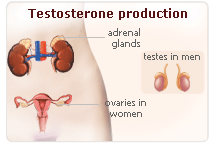Testosterone is an important hormone for the health of both men and women. Elevated levels of testosterone in women, however, can have potentially serious physical and psychological side effects, including depression and other mood disorders.
Just like estrogen, male hormones like testosterone (medicinally known as “androgens”) have a major influence on cognitive development. In utero, testosterone seems to impact the brain's development and behavioral responses. The hormone also may play a role in cognition well after infancy. Some medical doctors suggest that testosterone hormones may influence an adult brain's neurotransmitter receptors, which could cause the brain to react to stimuli in various ways, thus resulting in mood disorders such as depression or anxiety.

Doctors have found evidence that androgens may be linked to mood disorders in women in several cases: for instance, free testosterone levels tend to be higher in women who experience premenstrual syndrome (PMS) and depression. Augmented testosterone levels are also associated with postpartum depression, while women taking testosterone as part of their hormone replacement therapy during menopause reported abnormal hostile feelings.
A recent report authored by Weiner et al investigated the relationship of testosterone to mood by following 27 women with polycystic ovarian syndrome (PCOS), compared to 27 normal menstruating women. PCOS is an ailment of the endocrine system (the hormone-regulating system) that is defined in part by unusually high levels of free testosterone and lowered levels of estrogen and progesterone, which causes symptoms such as acne, increased body hair, and weight gain. PCOS is one of the most common causes of infertility in women.
27 women with PCOS were matched with 27 normally menstruating women according to body mass index (since being overweight, a common symptom of PCOS, can also be a cause of depression) and other demographic factors. Blood samples were taken at various points in the menstrual cycle to measure testosterone, estrogen and progesterone levels, and patients were required to complete questionnaires to self-evaluate levels of anxiety, depression, anger, life events, eating disorders, self-image and acne (another possible factor in depression).
The report determined that compared with women with normal levels of testosterone, women with higher testosterone levels experienced symptoms of depression that were more relentless and more intense. Paradoxically, however, risk for depression augmented only if testosterone levels were slightly above normal; extremely augmented androgen levels do not appear to have an affect on depression, anxiety or aggression.
Weiner et al found that although the PCOS women could be at an increased risk for depression due to the symptoms of their illness (such as acne, weight gain, and hirsutism, or increased body/facial hair), because the symptoms of depression and anxiety decreased with increased testosterone (and hence increased symptoms), one may conclude that this is a hormonal, and not a psychological effect.
The study concluded that even after accounting for other symptoms (like acne and being overweight) that could influence the mood of women suffering from PCOS, elevated levels of testosterone was still the main cause of depression.